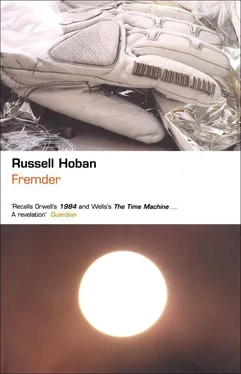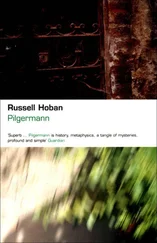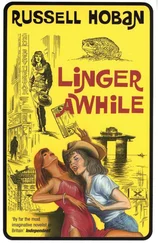Russell Hoban - Fremder
Здесь есть возможность читать онлайн «Russell Hoban - Fremder» весь текст электронной книги совершенно бесплатно (целиком полную версию без сокращений). В некоторых случаях можно слушать аудио, скачать через торрент в формате fb2 и присутствует краткое содержание. Год выпуска: 2003, Издательство: Bloomsbury, Жанр: Современная проза, Фантастика и фэнтези, на английском языке. Описание произведения, (предисловие) а так же отзывы посетителей доступны на портале библиотеки ЛибКат.
- Название:Fremder
- Автор:
- Издательство:Bloomsbury
- Жанр:
- Год:2003
- ISBN:нет данных
- Рейтинг книги:4 / 5. Голосов: 1
-
Избранное:Добавить в избранное
- Отзывы:
-
Ваша оценка:
- 80
- 1
- 2
- 3
- 4
- 5
Fremder: краткое содержание, описание и аннотация
Предлагаем к чтению аннотацию, описание, краткое содержание или предисловие (зависит от того, что написал сам автор книги «Fremder»). Если вы не нашли необходимую информацию о книге — напишите в комментариях, мы постараемся отыскать её.
Fremder — читать онлайн бесплатно полную книгу (весь текст) целиком
Ниже представлен текст книги, разбитый по страницам. Система сохранения места последней прочитанной страницы, позволяет с удобством читать онлайн бесплатно книгу «Fremder», без необходимости каждый раз заново искать на чём Вы остановились. Поставьте закладку, и сможете в любой момент перейти на страницу, на которой закончили чтение.
Интервал:
Закладка:
‘I’m talking to you, clipcock,’ said Albert.
Without thinking I said, ‘Quiet!’
‘What did you say?’
‘Piss off.’
‘Make me.’
The colours of my craziness roared and bellowed in my ears. I jumped off the roof on to Albert and when Miranda came running and pulled me off him he had a concussion and a broken nose. It was a one-off kind of thing — the mind didn’t speak to me again and the craziness didn’t come again but for the rest of my time at The Cauldron there was no more bother from Albert or anyone else.
Things come to an end, though, and when I was twelve they shipped me out of The Cauldron to the Pre-Poly where a boy named Josef Czerny immediately recognised me as his opposite number in the traditional binary. I kept hoping that the mind would speak to me again and show me those many colours of craziness that had enabled me to deal with Albert Stiggs but it didn’t happen and I had no more successes of the Stiggs sort for the rest of my school days.
Twelve isn’t too early to have an aim in life. I felt a craving in me for deep space but most of all I wanted to make friends with that mind that had spoken to me. Not just so I could beat up people who bothered me. No, I wanted to be with it because it was the best feeling I’d ever had and I wanted to have that feeling again, however long it took to get there.
6
I get along without you very well,
Of course I do …
Hoagy Carmichael, ‘I Get Along Without You Very Well’I’m looking at a photo of my mother. There was a German artist, Max Klinger (1857–1920), who attempted a variety of themes and was better with some than with others. The Klinger plate I look at most is an etching, Im Walde, In the Wood : there’s a footpath under dark trees whose bare black branches twist overhead in cold sunlight and shadow. The air seems whispery and breathless. By the side of a path lies a folded coat, on it a white envelope. Nearby an upturned hat shows its emptiness. In that cold sunlight the coat is abject and defeated, the hat projects a pathetic shadow. Beyond the coat and the hat stands a large tree with a double trunk but the right-hand one is only a cut-off stump. The deep black shadow of that tree across the path is irrevocable. Helen Gorn in all of her photographs seems to be looking at me out of that wood.
Even when she was young there was nothing charming about her face: she had a long jaw, a heavy mouth, a big nose. And large eyes that make you ask, ‘What, Helen? What is it you want?’ But there’s a photo of her on a beach on the island of Cephalonia in the summer of 2015 when she was seventeen: a tall girl, golden-brown. Wearing nothing but her nakedness and a bit of white cloth and string covering her sex. Her body’s half-turned away from the camera and she’s looking back over her shoulder. Long dark hair blowing in the wind as she holds a beach ball high over her head. Long torso, small breasts, round bottom, a dancer’s legs. Like an art nouveau figure holding up a lamp. And almost a smile on her face.
She had little use for contemporary artists of any kind: she liked Bach and Chopin and Thelonious Monk and she played the saxophone. She liked The Old Testament and Rilke, Caspar David Friedrich and Odilon Redon, the sound of rain and the small hours of the night. It’s raining now. Almost three in the morning. Down in the street below the barrier screen Prongs and Arseholes are fighting by the light of torches as I listen to Gislebertin’s Dédales , performed by the composer on the organ of the church of St Lazarus at Autun. The volume is turned down so low that I’m not sure if I’m hearing it or just thinking it.
Here and gone, the music; the mind shielding it from the winds of forgetting, holding what is partly now and partly remembered. Here and gone the whisper of the vox humana in the stones of darkness. On earth and out beyond the Hawking Threshold yesterdays and everydays in the morning mirror, the red glimmer of the Dog Nebula, the unremembrance of flicker dreams, a tawny owl flying low over the heather in the Grampians, great sea-shapen rocks at Portknockie, and the rattle of pebbles in the suck of the tidewash …
Begin, and cease, and then again begin,
With tremulous cadence slow, and bring
The eternal note of sadness in.
I’ve got photographs of my mother with her brother. He was like Franz Kafka, all eyes and ears. Looked as if a blackness inside him was trying to join up with a blackness outside. Here’s one of his notebook entries written shortly before he died:
18.2.22
In the beginning was The Black. Sing it. Feel it. Hold it. Only The Black. O the too-muchness of The Black. In the beginning was the forever of The Black and it went on for ever. Then! After for ever! In The Black was The Rage growing growing growing. AAAAIIIIYEEEEEE! How it wanted how it waited. Yes, TO BECOME! So it NNNNNNGGHHH YNNNGGGHH AAAAAAAAA. Became. Now it is. Now it is Itself. The Rage. Sing it. Feel it. Rock in the cradle of it. NNNNNNNNNNNNNNN NNNNNNNYAHHHH. The Rage. It is now. It is beyond for ever. In it is every thing.
I too feel The Black and The Rage in everything; maybe it’s a family trait. I’ve always felt them, even long ago with Judith when we saw the owl. I feel The Black and The Rage when I’m alone and perhaps even more when I’m not.
Thinking about Helen and Isodor: I see them in the darkened laboratory at the top of that big old Victorian house in Oldtown West 71.1 can smell formalin and furniture polish, old upholstery and carpets. And that other smell: of a house where the parents have died. Bookshelves everywhere, busts and paintings, framed photographs of Planck, Heisenberg, Einstein, Hawking, Rilke, and Thelonious Monk. Also dead and Gorn aunts and uncles: if they weren’t scientists or mathematicians they played the violin.
I’ve never actually seen that room but it’s very vivid in my imagination, always with rain streaming down the windows. Isodor is in his wheelchair; he wasn’t born crippled: he and Helen made the mistake of looking Jewish when some Shorties and Clowns caught them at street level one night. What they did to her doesn’t show. He was sixteen and she was twenty-one when it happened (I sometimes wonder why they were down at street level when they both had keys to the Class A walkway. Reality envelopes interest me). His head is shaved and he’s got a perspex window in the top of his skull. The Shorties and their friends didn’t do that — this is research. Under the perspex his brain looks like a strange and ancient coral. Wires from it pass through the perspex to a console where Helen moves a slider and watches her gauges. It’s the middle of the night; the curtains are drawn, the room is dark; their faces, dimly lit by the console, gleam with a religious fervour. I can hear the rain.
Here’s part of the transcript for 16 February 2022:
LIMBIC SYSTEM — SESSION 318
(03:40. RAIN, MUSIC: THE ART OF FUGUE )
H : Amygdala, site 26, right anterior:.5 sec, 80 Hz.
I : (CHILDISH VOICE) Oh, oh.
H : What’s the matter?
I : The bed’s all wet. (CRYING) I’m sorry, Mummy, I’ll try very hard not to do it again. Sorry, sorry, sorry, Mummy. Not do it again, no.
H : Was it the bad dream again, Izzy?
I : No, it was a nice one: I was mountains, I was valleys, I was the rain.
H : Did you like being the rain?
I : Yes.
H : Why did you like being the rain?
I : The rain doesn’t know anything, the rain doesn’t have dreams.
H : Amygdala, site 27, right anterior:.5 sec, 80 Hz.
Читать дальшеИнтервал:
Закладка:
Похожие книги на «Fremder»
Представляем Вашему вниманию похожие книги на «Fremder» списком для выбора. Мы отобрали схожую по названию и смыслу литературу в надежде предоставить читателям больше вариантов отыскать новые, интересные, ещё непрочитанные произведения.
Обсуждение, отзывы о книге «Fremder» и просто собственные мнения читателей. Оставьте ваши комментарии, напишите, что Вы думаете о произведении, его смысле или главных героях. Укажите что конкретно понравилось, а что нет, и почему Вы так считаете.












